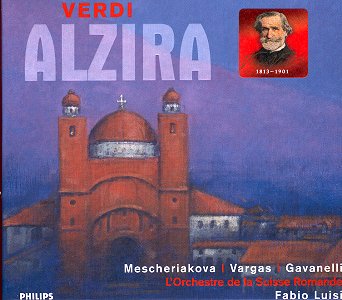Verdi composed prolifically during the 1840s, the period he described as his 'years as a galley slave'. Consequently the operas of that decade have met with mixed success, with some encumbered with reputations as representing the master at something less than the height of his powers.
Yet reputations can be misleading, and there is no more worthy cause in the world of music than that of reassessing the nature of works whose performing history has been difficult. Alzira (1845) certainly comes into this category, and in this the composer's centenary year, the time is right to undertake a reconsideration.
As such this new Philips recording from Geneva is to be welcomes with the utmost enthusiasm. And there is much to enthuse about, even if the opera's problematic nature is confirmed. It is not a perfect work, by any means, but it does sound like Verdi in every bar, and there are riches galore. The characterisation suffers particularly from the cuts to the original Voltaire story, which never really allow the cast to be developed with the subtlety of which Verdi was already capable in 1845. Consequently the drama moves forward at a very rapid pace, with the admitted advantage that it has abundant pace. The numbers for the soldiers' chorus in Act I are particularly exciting and pacy, brilliantly performed and directed.
The opera boasts no famous arias for star singers to bring to the public in outdoor concerts in the rain. Therefore it is no surprise that the cast assembled under Fabio Luisi's direction should contain many unknown names. The results are mixed. Most taxed is the best known of the singers, the tenor Ramón Vargas, whose naturally lyric voice is stretched by a role which contains much declamation. And under pressure in ensembles, the bass voice of Paolo Gavanelli tends to lose its security of tone. But I stress that these are relative caveats, by no means completely damaging to the musical experience.
The project clearly had a small budget, since only four days were given to the recording sessions, an unusually short period for an opera, particularly an opera not already held in the artists' repertories. But all praise to Philips for their enterprise.
The musical pacing, so important if an opera is to work as a purely aural experience on CD, is fast and often exciting, and the tragic denouement, dealing with the blessing given at his death by Gusmano to the lovers whose happiness he had thwarted during his life is a genuinely moving scene, perhaps the highlight of the score. (Verdi probably intended it as such.)
In the title role of Alzira Mescheriakova has a wide vocal range, but she is not always completely in control of her voice, and the response to details is sometimes lost. Probably the best aspects of the performance are orchestral and choral, which would confirm that more rehearsal time was really required.
For all these doubts, Verdi's genius still shines through. This opera will not make an impact on the world's stages as the result of this new recording, but listening to it will bring rewards to anyone sensitive to Verdi's greatness, and it is hard to think of many music lovers who do not come into that category.
Terry Barfoot
